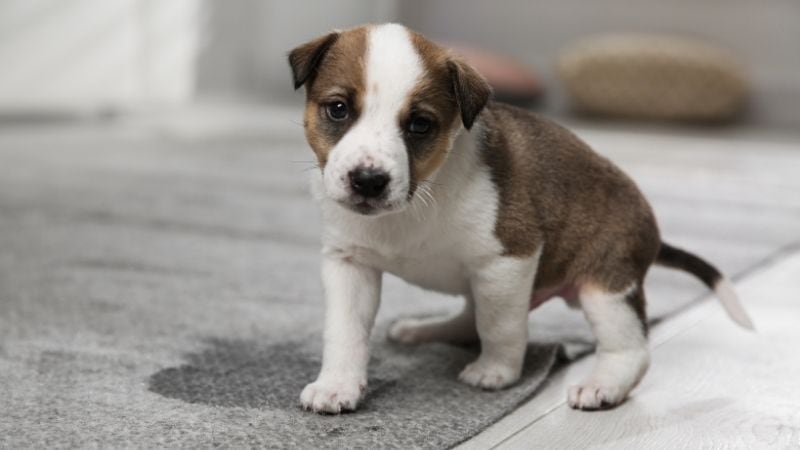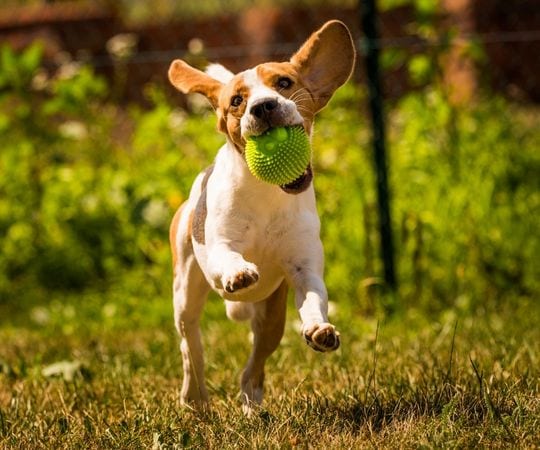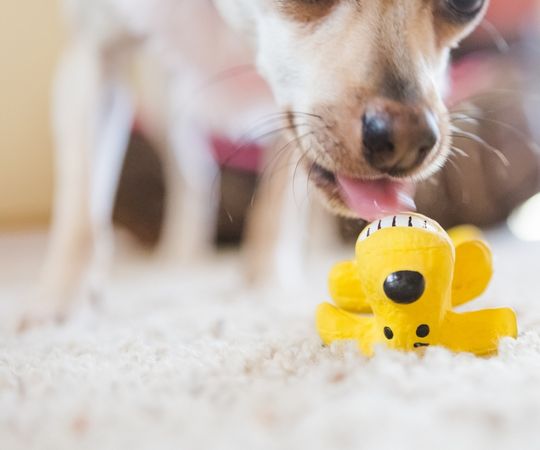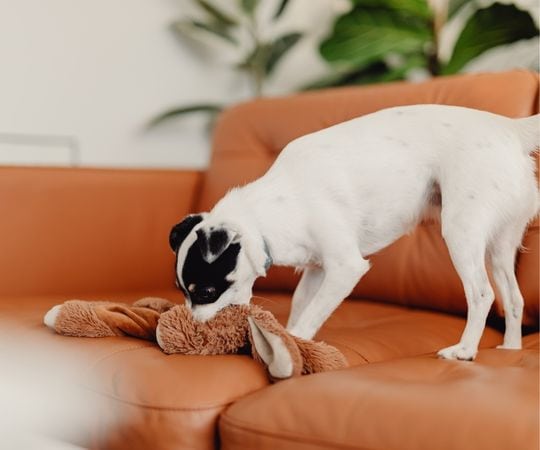
Coming home to find your dog has peed on your bed is one of the most frustrating experiences for any pet owner. This behavior can leave you confused, angry, and wondering if your furry friend did it on purpose.
In this article, we’ll discover why your dog chooses your bed as a bathroom and learn proven solutions to stop this behavior — so you can finally enjoy a fresh, accident-free sleeping space again.
Why Does My Dog Pee on My Bed?
Dog owners often face confusion when their pet suddenly starts urinating on their bed. Keep reading to discover the most common reasons behind this behavior.
Medical Causes
Medical problems are often the first thing to rule out when your dog starts peeing on your bed. Urinary tract infections can make dogs feel the urgent need to pee anywhere, including your bed. Bladder stones and kidney disease also cause frequent urination. Diabetes and other hormonal issues can increase how much your dog drinks and pees. These conditions make it hard for dogs to control when and where they pee.
Common medical causes include:
- Urinary tract infections
- Bladder stones
- Kidney disease
- Diabetes
- Arthritis (makes it hard to get outside)
Take your dog to the vet if the peeing started suddenly. Blood tests and urine samples can help find medical problems.
Marking Territory
Dogs often mark when they feel their territory is threatened. New pets, people, or changes in the house can trigger marking behavior. They prefer marking items that carry their family members’ scent. Your bed smells strongly like you, making it a prime target for marking.
Additionally, male dogs mark more than female dogs. Unneutered dogs are more likely to mark than fixed dogs.
Signs your dog is marking:
- Small amounts of pee
- Lifting their leg while peeing
- Sniffing the area first
- Only peeing on certain spots
Spaying or neutering often reduces marking.
Anxiety or Stress
Stressed dogs sometimes pee in places where they feel safe and comfortable. Separation anxiety makes some dogs pee when you leave or right before you come home. They might choose your bed because it helps them feel closer to you.
Changes in routine, moving homes, or new family members can cause stress. Even positive changes like new furniture can upset some dogs.
Submissive urination happens when your dog feels nervous or excited. This behavior is more common in younger dogs and anxious pets.
A professional dog trainer can help you identify stress triggers. They can teach you ways to help your dog feel more secure.
Excitement Peeing
Some dogs, especially young dogs, may urinate when overly excited. This happens most often when you come home or during playtime. Unlike other types of elimination, excitement urination involves involuntary bladder muscle relaxation – the dog literally can’t control it. Most dogs usually grow out of this excitement peeing by one year of age, but sensitive dogs might require more time to develop better bladder control.
Punishment makes excitement peeing worse. Instead, focus on staying calm and giving your dog time to settle down.
Lack of Housetraining
Dogs who aren’t fully housetrained might not understand that beds are off-limits for peeing. This problem is most common in puppies and newly adopted dogs.
Maintain consistency in training. Inconsistent training confuses dogs about where they should and shouldn’t pee. Everyone in your family needs to follow the same rules.
Aging
Senior dogs often develop bladder control problems as they age. Weak bladder muscles make it hard to hold pee for a long period, leading to occasional incontinence.
Cognitive decline in senior dogs can cause them to forget their house training. They might not remember that beds are not appropriate places to pee.
Senior dogs need more frequent potty breaks. Consider using waterproof mattress covers to protect your bed.
Scent Attraction
Dogs have powerful noses that can detect old pee smells even after cleaning. If your bed was peed on before, your dog might smell traces and pee there again. Even tiny amounts of old pee can attract your dog to the same spot.
Block access to your bedroom until the behavior stops.
How to Stop and Prevent This Behavior?
Stopping your dog from peeing on your bed requires a multi-step approach that addresses both medical and behavioral causes.
Rule Out Medical Issues
Schedule a veterinarian visit first. Many dogs pee on beds due to medical problems like urinary tract infections, bladder stones, or kidney disease.
Your vet will run urine tests and blood work. They may also do X-rays to check for stones or other issues.
Some medications can also increase urination. Tell your vet about any drugs your dog takes.
Clean with Enzyme Cleaner
Regular cleaners won’t remove urine odor completely. Dogs can still smell it and may pee in the same spot again.
Use enzyme cleaners that:
- Break down urine proteins
- Remove odor at the molecular level
- Prevent repeat accidents
- Blot up fresh pee immediately
- Use enzyme cleaners made for pet urine
- Let the cleaner sit for the recommended time
- Rinse thoroughly and let dry completely
Don’t use ammonia-based cleaners. They smell like urine to dogs and can make the problem worse.
Reduce Stress
Stress and anxiety cause many dogs to pee inappropriately. The following three methods can help reduce stress.
- Create a calm environment with consistent routines. Give your dog a safe space with their own bed and toys.
- Consider anxiety supplements or calming aids like thunder shirts. For severe anxiety, talk to your vet about anti-anxiety medication.
- Exercise helps reduce stress. Take your dog for longer walks or play more interactive games.
Restrict Access to Your Bed
Block access to your bedroom when you can’t supervise your dog. Install a baby gate or keep the door closed. This prevents accidents while you work on the root problem.
Management strategies:
- Crate your dog when unsupervised
- Keep your dog in a different room during the day
- Only allow bed access when you’re present
- Remove throw pillows and blankets they might target
Try to make their own sleeping area more appealing. Use comfortable bedding and place it in a quiet spot.
Gradually allow supervised access as the behavior improves. Always watch for signs that they need to go outside.
Reinforce Potty Training
Go back to basic house training even with adult dogs. Take them outside more frequently and use high-value treats and praise when they pee outside. Make it more rewarding than peeing inside.
Training schedule:
- First thing in the morning
- After meals and water
- Before bedtime
- Every 2-3 hours during the day
Watch for signs your dog needs to go out, like sniffing, circling, or whining. Take them outside immediately when you see these behaviors.
Never punish accidents. Clean them up calmly and stick to your training routine.
If you’re finding this challenging, consider seeking professional help. A professional dog trainer can help with stubborn cases. They can identify specific triggers and create a training plan.
Frequently Asked Questions
What could cause a dog to suddenly start peeing on the bed?
There are several reasons. Medical issues are the most common reason for sudden bed wetting in dogs. Anxiety and stress from changes in your home can also trigger this behavior. Age-related issues affect older dogs who may lose bladder control.
How can I effectively clean my bed after my dog has urinated on it?
Remove all bedding immediately and wash it in hot water with an enzyme-based detergent. Clean your mattress with a mixture of white vinegar and water. Spray the area thoroughly and let it air dry completely before using the bed again. Use baking soda on the mattress after it dries to absorb any remaining odors. Vacuum it up after several hours to remove all residue.
Can sudden changes in a dog’s environment lead to them peeing on the bed?
Yes. Moving to a new home often triggers stress-related accidents in dogs. Your pet needs time to adjust to unfamiliar spaces and smells. Also, new family members or pets can make your dog feel anxious. They might urinate on your bed to seek comfort or mark their territory. In addition, changes in your work schedule can disrupt your dog’s bathroom routine. Dogs need consistent potty breaks to maintain good habits.



